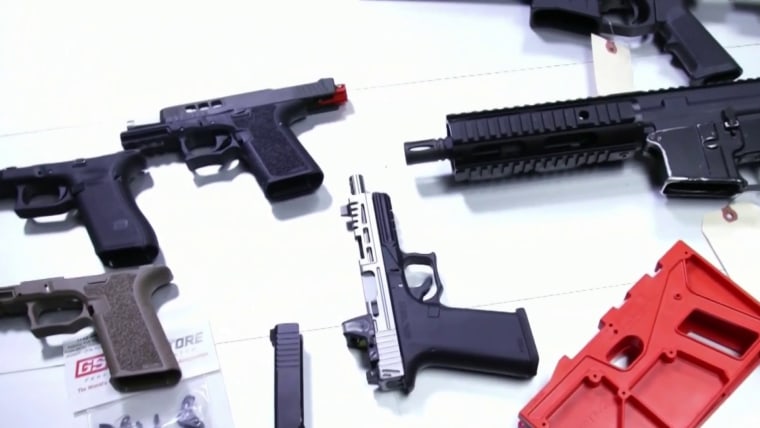On Dec. 1, 2020, federal agents knocked on an apartment door looking for an Atlanta-area rapper — a key suspect in a monthslong investigation into a ring trafficking guns from Georgia to Philadelphia.
Fredrick Norman — aka “Slowkey Fred” — wasn’t there that December day, but the woman who answered the door, Brianna Walker, texted Norman, warning him the agents were there, according to a search warrant affidavit.
“Don’t say nun,” federal agents wrote that he replied. “Just say u sold it at a gun show or sum.”
For months, agents with the Bureau of Alcohol, Tobacco, Firearms and Explosives had been building a case against Norman, Walker and two other suspects. The agents ultimately traced nearly 300 firearms purchased in Georgia from dozens of gun retailers to the suspects after some were found at crime scenes and in the possession of convicted felons in Philadelphia, according to records and interviews with federal law enforcement.
April 11, 202200:25
“We know that these guns are being used in crimes,” said Eric Degree, the assistant special agent in charge of the ATF office in Philadelphia.
The federal investigation expanded to include 11 suspects in Georgia and Pennsylvania, all of whom face a conspiracy charge. Kenneth Burgos, 23, and Edwin Burgos, 29 — brothers accused of brokering sales in Pennsylvania — are also charged with dealing firearms without a license, officials said.
In an interview with ATF agents at the apartment in Atlanta in 2020, Walker admitted to buying 50 to 60 guns in order to sell them without a dealer’s license, according to the affidavit — a violation of federal law. Norman allegedly admitted to buying more than 100, according to federal records.
Norman told NBC News in an interview that he didn’t remember what he told ATF back in 2020. The 25-year-old resident of Villa Rica also declined to discuss the charges against him and whether he’d entered a plea. But he did describe himself as a “gun enthusiast,” an interest he said began when he attended his first gun show in early 2020 — just a few months before prosecutors said he started making straw purchases.
“I never knew how open guns was in Georgia,” Norman said. “The whole process threw me off. You walk in, and then there’s a police officer sitting at the front. And they don’t check for, you know, ID or carry licenses or if you’re a felon or nothing.”
As of Friday, there was no attorney listed for nine defendants named in the indictment, most of whom court records listed as in federal custody pending arraignment and who could not be reached for comment. A lawyer for Edwin Burgos declined to comment. A lawyer for another defendant, Roselmy Rodriguez, did not respond to requests for comment. Both Burgos and Rodriguez have pleaded not guilty to all charges.
Officials said the ring ran a classic straw-purchasing scheme, in which someone buys a gun for someone else who typically can’t legally buy one or doesn’t want to leave a paper trail. Between June and December 2020, the Georgia defendants allegedly bought guns almost daily at stores like Academy Sports, Adventure Outdoors and a string of pawn shops, then trafficked them to Pennsylvania, according to the 60-page indictment unsealed last month.
The indictment says agents found 4,000 rounds of ammunition at the raided apartment in Georgia, along with 183 empty gun boxes — most of which officers could trace back to weapons purchased by the defendants.
Degree said that although straw-purchasing schemes were common, they were typically smaller in scale. Someone might enlist a relative or friend to buy a handful of weapons, for example. He described the allegations against Norman, the Burgos brothers and their co-defendants as a “large firearms trafficking scheme.”
Norman led the scheme in Georgia, according to the indictment, while the Burgos brothers led it in Philadelphia. Prosecutors said in a separate court filing that Edwin Burgos had admitted to brokering sales during an interview with ATF.
March 18, 202206:25
Guns traced by federal agents investigating the case were recovered from felons and found abandoned at crime scenes, according to court filings and interviews — some just days after they were purchased.
After two years of record gun violence in Philadelphia, officials are concerned that more weapons from this case could turn up in the wrong hands.
“I’m sure we have not recovered them all,” Degree said. “There’s still firearms purchased by these individuals that are most likely still on the street.”
Norman said he wants to bring something positive out of the situation he’s in and continue to pursue his music. He declined to comment when asked about people who might be hurt by the guns that prosecutors say he helped traffic. But he said he isn’t a violent person.
“I do care about people, and I do care about harm being brought towards people,” he said. “Because I’m not an advocate of violence.”
Charges in straw-purchasing cases can look administrative, Degree said — lying on a form and selling guns without a license. But he said these kinds of schemes are far more than just paperwork crimes.
The Burgos brothers face a statutory maximum of 10 years in prison if convicted, according to the U.S. Attorney’s Office for the Eastern District of Pennsylvania, while the other nine defendants each face a five-year statutory maximum if convicted.


